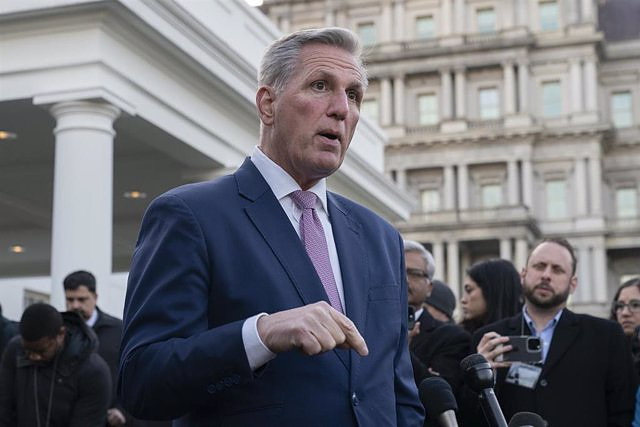MADRID, 2 Feb. (EUROPA PRESS) -
The president of the United States, Joe Biden, has reiterated this Wednesday his refusal to negotiate with the Republicans an increase in the debt ceiling, alleging that he expects the House of Representatives to approve the measure as it has been done during all US administrations.
"The Constitution of the United States is explicit about this obligation, and the American people expect Congress to comply with it in the same way that all its predecessors have done. It is not negotiable or conditional," the president stressed during a meeting with the president. of the Lower House, Republican Kevin McCarthy.
Biden has argued that it is the obligation of Congress not to allow a default on the debt that the State has, assuring that it would be "economically catastrophic", as reported in a statement by the White House.
In this sense, he has been open to discussing with the Republican Party ways to reduce the deficit and control the national debt while continuing to increase the debt ceiling. Thus, he has recalled that during his first two years at the helm of the administration the deficit would have been reduced by 1,700 million dollars (1,540 million euros), a fact that he has described as "record".
The speaker of the House of Representatives, for his part, has affirmed before Biden that the country cannot continue "squandering" the money it does not have, thus charging the payments to the next generations.
"Our debt is too high. We have waste in our government. The problem is getting worse, not better," McCarthy asserted in statements to the press after his meeting with Biden.
In this sense, he has called on Republicans and Democrats to work together in order to establish "a responsible debt limit" that puts the United States "on the path of a balanced budget."
The United States Congress, which is the one who decides the federal government's budget, has the power to authorize the issuance of debt necessary to cover it in the event of a deficit (when more is spent than what is received).
The norm, which has its origins in a 1917 law, has historically been respected by both the Republican Party and the Democratic Party, regardless of who held the majority of both chambers, without using the increase in the debt ceiling as a political weapon. .
However, since the Clinton Administration, the Republicans have threatened the Democrats on numerous occasions not to approve the increase in the debt ceiling, which would lead the United States to default on its obligations, which in turn -- having considering the size of the US economy--could lead to a global financial crisis.
For this reason, Biden has shown his refusal to give concessions to the Republican Party in exchange for their approval of the increase in the debt ceiling, alleging that this has never been the case and that a financial crisis would only be the responsibility of the Republicans.

 Exploring Cardano: Inner Workings and Advantages of this Cryptocurrency
Exploring Cardano: Inner Workings and Advantages of this Cryptocurrency Seville.- Economy.- Innova.- STSA inaugurates its new painting and sealing hangar in San Pablo, for 18 million
Seville.- Economy.- Innova.- STSA inaugurates its new painting and sealing hangar in San Pablo, for 18 million Innova.- More than 300 volunteers join the Andalucía Compromiso Digital network in one month to facilitate access to ICT
Innova.- More than 300 volunteers join the Andalucía Compromiso Digital network in one month to facilitate access to ICT Innova.-AMP.- Ayesa acquires 51% of Sadiel, which will create new technological engineering products and expand markets
Innova.-AMP.- Ayesa acquires 51% of Sadiel, which will create new technological engineering products and expand markets The parties open the election campaign in Catalonia
The parties open the election campaign in Catalonia Javier Tebas: "The CSD Commission does not have legal protection"
Javier Tebas: "The CSD Commission does not have legal protection" STATEMENT: Repair your Debt Lawyers cancels €65,000 in Cantabria with the Second Chance Law
STATEMENT: Repair your Debt Lawyers cancels €65,000 in Cantabria with the Second Chance Law RELEASE: Zoomlion shines at INTERMAT 2024 with a vision for a greener and smarter future
RELEASE: Zoomlion shines at INTERMAT 2024 with a vision for a greener and smarter future How Blockchain in being used to shape the future
How Blockchain in being used to shape the future Not just BTC and ETH: Here Are Some More Interesting Coins Worth Focusing on
Not just BTC and ETH: Here Are Some More Interesting Coins Worth Focusing on Retrópolis brings the golden age of video games and computing to the UPV
Retrópolis brings the golden age of video games and computing to the UPV Looking for video games that value the neighborhoods of Valencia
Looking for video games that value the neighborhoods of Valencia UPV researchers improve the efficiency of air conditioning systems using a geothermal heat pump
UPV researchers improve the efficiency of air conditioning systems using a geothermal heat pump València is committed to citiverse and smart tourism to be "the reference technological hub of the Mediterranean"
València is committed to citiverse and smart tourism to be "the reference technological hub of the Mediterranean" A million people demonstrate in France against Macron's pension reform
A million people demonstrate in France against Macron's pension reform Russia launches several missiles against "critical infrastructure" in the city of Zaporizhia
Russia launches several missiles against "critical infrastructure" in the city of Zaporizhia A "procession" remembers the dead of the Calabria shipwreck as bodies continue to wash up on the shore
A "procession" remembers the dead of the Calabria shipwreck as bodies continue to wash up on the shore Prison sentences handed down for three prominent Hong Kong pro-democracy activists
Prison sentences handed down for three prominent Hong Kong pro-democracy activists ETH continues to leave trading platforms, Ethereum balance on exchanges lowest in 3 years
ETH continues to leave trading platforms, Ethereum balance on exchanges lowest in 3 years Investors invest $450 million in Consensys, Ethereum incubator now valued at $7 billion
Investors invest $450 million in Consensys, Ethereum incubator now valued at $7 billion Alchemy Integrates Ethereum L2 Product Starknet to Enhance Web3 Scalability at a Price 100x Lower Than L1 Fees
Alchemy Integrates Ethereum L2 Product Starknet to Enhance Web3 Scalability at a Price 100x Lower Than L1 Fees Mining Report: Bitcoin's Electricity Consumption Declines by 25% in Q1 2022
Mining Report: Bitcoin's Electricity Consumption Declines by 25% in Q1 2022 Oil-to-Bitcoin Mining Firm Crusoe Energy Systems Raised $505 Million
Oil-to-Bitcoin Mining Firm Crusoe Energy Systems Raised $505 Million Microbt reveals the latest Bitcoin mining rigs -- Machines produce up to 126 TH/s with custom 5nm chip design
Microbt reveals the latest Bitcoin mining rigs -- Machines produce up to 126 TH/s with custom 5nm chip design Bitcoin's Mining Difficulty Hits a Lifetime High, With More Than 90% of BTC Supply Issued
Bitcoin's Mining Difficulty Hits a Lifetime High, With More Than 90% of BTC Supply Issued The Biggest Movers are Near, EOS, and RUNE during Friday's Selloff
The Biggest Movers are Near, EOS, and RUNE during Friday's Selloff Global Markets Spooked by a Hawkish Fed and Covid, Stocks and Crypto Gain After Musk Buys Twitter
Global Markets Spooked by a Hawkish Fed and Covid, Stocks and Crypto Gain After Musk Buys Twitter Bitso to offset carbon emissions from the Trading Platform's ERC20, ETH, and BTC Transactions
Bitso to offset carbon emissions from the Trading Platform's ERC20, ETH, and BTC Transactions Draftkings Announces 2022 College Hoops NFT Selection for March Madness
Draftkings Announces 2022 College Hoops NFT Selection for March Madness























